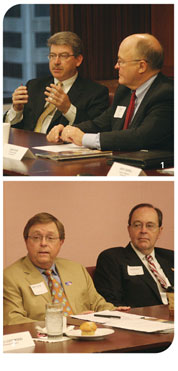“Tell them to cut up their credit cards,” offered one wag. “It’s that simple.”
Dan Dechant suggested that advisors “be on both sides of that ledger and do have products and services to help [clients],” especially those early in their careers who have yet to learn money management.
For Doug Lockwood, it was a matter of reaching people when they are young and trying to get them to understand not only debt management, but also debt avoidance, and how that fits in with their overall financial plan.
“Creating that education of balance is almost a burden upon our industry,” observed Tim Hattey. “It goes along with what everyone else has said, which is gather as much information as you can to get on that holistic approach to wealth building.”

1: Tim Hattey of Bank of Kansas City discusses the importance of educating clients of their options and recommending a balance for their investment portfolios. Jack Ovel with Commerce Bank observes with interest.
2: Tommy Taylor of Shughart Thomson & Kilroy believes investment advisors should perhaps be equipped with a degree in psychology or theology. Dwayne White of Country Club Trust Company observes.
Scott Boswell talked about the book, Ultimate Gift, and its premise that parents use the estate plan to affect how children behave as adults and how they develop. He asked whether had seen that kind of planning locally.
“I have seen very little of that,” said Tommy Taylor.
“I see more and more of it,” countered Lori Gregory. “I love the idea of people teaching their children about philanthropy, about what it’s like to go out and get a job and what it’s like to make minimum wage.” Clients, she noted, don’t want their children to end up as classic trust-fund babies.
Mike Searcy has also seen growing concern about the dysfunctional “trust- fund baby concept.” To deal with the resulting anxiety, his eponymous firm started innovating with family retreats. “It forces them all together.”
His firm has also recommended that parents give their children some seed capital early on and then teach them the values and principles they will need to prosper.
“The number one thing to do,” affirmed Matt Wagner, “is make sure the clients are communicating with their kids. You have got to encourage that communication so that everyone knows the reasons why things are set up a certain way.”
Recruiting Talent
One of the challenges that several participants cited was that of recruiting good talent. Scott Boswell asked his colleagues what, as organizations, they are doing to make sure that they were attracting the type of talent they needed.
One of the problems Commerce Trust has in finding the right people, Joe Williams offered, is the lack of relevant college programs. “You have to train them,” he added. “As soon as you get them trained, everyone around this table is trying to find them and hire them away from you.”
“Wealth management is not viewed as a life skill,” affirmed Sherman Titens of PrivateBank. “And it needs to be.” He recommended that the industry be more aggressive in reaching people when they are younger either through the educational establishment or outside of it.
Mike Deardorff, with the US insurance operations of RBC, Royal Bank of Canada, suggested that one creative training strategy was to take advantage of professionals who, in another time, might have gone into retirement. He recommended coupling that senior advisor with a young recruit. “The 20-year-old needs all that experience the 60-year-old is going to bring to the plate,” he observed.
Fred Dunn offered two refinements on this scheme. One is to make sure that that older person is actively involved in the decision to hire the person to be trained. “There has to be a real buy-in there.” The second variable is to make sure that the older person is also willing to learn from the younger person.
Dana Abraham spoke highly of UMB’s “very intensive management training.” In addition to the technical aspects, young graduates learn listening skills, facilitative questioning, and leadership skills. “They don’t get that in college,” she observed.
(...continued)